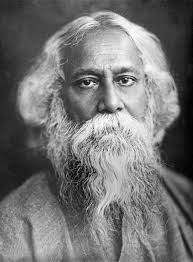Rabindranath Tagore: Difference between revisions
Created page with "{{#seo: |title=Rabindranath Tagore – Indian Poet, Philosopher, and Nobel Laureate |description=Rabindranath Tagore was an Indian polymath—poet, philosopher, and the first Asian Nobel laureate—best known for Gitanjali and composing India's national anthem. |keywords=Rabindranath Tagore, Tagore biography, Gitanjali, Jana Gana Mana, Nobel Prize, Indian poet, Bengali literature, Visva-Bharati, Knowlepedia |image=Rabindranath Tagore.jpg }} {{Infobox deceased | name..." |
No edit summary |
||
| (One intermediate revision by the same user not shown) | |||
| Line 27: | Line 27: | ||
| age_at_death = 80 | | age_at_death = 80 | ||
}} | }} | ||
'''Rabindranath Tagore''' (7 May 1861 – 7 August 1941) was a legendary Indian poet, philosopher, painter, and composer, best known for authoring ''Gitanjali'' and writing the Indian national anthem, ''Jana Gana Mana''. He was the first non-European to win the Nobel Prize in Literature in 1913 and is celebrated as one of India’s greatest cultural icons. | '''Rabindranath Tagore''' (7 May 1861 – 7 August 1941) was a legendary Indian poet, philosopher, painter, and composer, best known for authoring ''Gitanjali'' and writing the Indian national anthem, ''Jana Gana Mana''. He was the first non-European to win the Nobel Prize in Literature in 1913 and is celebrated as one of India’s greatest cultural icons.<ref name="britannica">https://www.britannica.com/biography/Rabindranath-Tagore</ref> | ||
== Early Life and Education == | == Early Life and Education == | ||
Born in a prominent Bengali Brahmo family in [[Calcutta]], Tagore was homeschooled and | Born in a prominent Bengali Brahmo family in [[Calcutta]], Tagore was the youngest of thirteen children. He was largely homeschooled and wrote his first poem at the age of eight. At seventeen, he traveled to England to study law at University College London but returned without completing his degree, choosing instead to pursue literature, music, and education in India.<ref name="britannica" /> | ||
== Literary Contributions == | == Literary Contributions == | ||
* Authored over 2,000 songs, numerous short stories, essays, and | * Authored over 2,000 songs, numerous short stories, essays, plays, and novels. | ||
* His poetry collection '''''Gitanjali''''' brought him international | * His poetry collection '''''Gitanjali''''' brought him international recognition and won him the Nobel Prize in 1913.<ref name="nobel">https://www.nobelprize.org/prizes/literature/1913/tagore/biographical</ref> | ||
* | * He composed the national anthems of both India (''Jana Gana Mana'') and Bangladesh (''Amar Shonar Bangla''). | ||
== Educational & Social Reforms == | == Educational & Social Reforms == | ||
* Founded '''Visva-Bharati University''' in 1921 to | * Founded '''Visva-Bharati University''' in 1921 at Santiniketan to blend Eastern and Western educational ideals.<ref name="govt">https://www.indiaculture.gov.in/visva-bharati-university</ref> | ||
* | * Promoted rural development, self-reliance, and social reform through various initiatives tied to education and art. | ||
== Philosophy == | == Philosophy == | ||
Tagore’s philosophy | Tagore’s philosophy blended Vedantic spirituality with universal humanism. He advocated for personal and societal harmony, freedom of expression, and intercultural dialogue. He also openly criticized the rigidity of nationalism and British colonial oppression through his essays and public lectures.<ref name="britannica" /> | ||
== Legacy == | == Legacy == | ||
* | * The first Asian to receive the Nobel Prize in any field (Literature, 1913). | ||
* | * Considered a central figure in the [[Bengal Renaissance]] and modern Indian cultural revival. | ||
* His birthday is celebrated annually in West Bengal as '''Rabindra Jayanti'''. | * Influenced global literary and philosophical movements, including the works of W.B. Yeats and Albert Einstein. | ||
* His birthday is celebrated annually in West Bengal as '''Rabindra Jayanti'''.<ref name="toi">https://timesofindia.indiatimes.com/topic/Rabindra-Jayanti</ref> | |||
== See Also == | == See Also == | ||
| Line 53: | Line 54: | ||
* [[Jana Gana Mana]] | * [[Jana Gana Mana]] | ||
* [[Visva-Bharati University]] | * [[Visva-Bharati University]] | ||
* [[Bengal Renaissance]] | |||
* [[Nobel Prize in Literature]] | |||
== References == | == References == | ||
<references /> | <references /> | ||
[[Category:Articles needing expansion]] | |||
[[Category:Articles needing more references]] | |||
Latest revision as of 11:20, 14 July 2025
| Rabindranath Tagore | |
|---|---|

| |
| Rabindranath Tagore in the 1930s | |
| Born | 07 May 1861 |
| Birthplace | Calcutta, Bengal Presidency, British India (now Kolkata, West Bengal, India) |
| Died | 07 August 1941 (aged 80) |
| Place of death | Calcutta, British India |
| Resting place | Visva-Bharati University, Santiniketan |
| Nationality | Indian |
| Occupation | Poet, Writer, Composer, Philosopher, Painter |
| Years active | 1877–1941 |
| Known for | Gitanjali, Jana Gana Mana, Visva-Bharati University |
| Notable works | Gitanjali, The Home and the World, Kabuliwala, Chokher Bali, Jana Gana Mana |
| Awards | Nobel Prize in Literature (1913) |
| Spouse(s) | Mrinalini Devi |
| Children | 5 (including Rathindranath Tagore) |
| Parents | Debendranath Tagore (father), Sarada Devi (mother) |
| Religion | Hinduism |
| Website | Visva-Bharati University |
Rabindranath Tagore (7 May 1861 – 7 August 1941) was a legendary Indian poet, philosopher, painter, and composer, best known for authoring Gitanjali and writing the Indian national anthem, Jana Gana Mana. He was the first non-European to win the Nobel Prize in Literature in 1913 and is celebrated as one of India’s greatest cultural icons.[1]
Early Life and Education
Born in a prominent Bengali Brahmo family in Calcutta, Tagore was the youngest of thirteen children. He was largely homeschooled and wrote his first poem at the age of eight. At seventeen, he traveled to England to study law at University College London but returned without completing his degree, choosing instead to pursue literature, music, and education in India.[1]
Literary Contributions
- Authored over 2,000 songs, numerous short stories, essays, plays, and novels.
- His poetry collection Gitanjali brought him international recognition and won him the Nobel Prize in 1913.[2]
- He composed the national anthems of both India (Jana Gana Mana) and Bangladesh (Amar Shonar Bangla).
Educational & Social Reforms
- Founded Visva-Bharati University in 1921 at Santiniketan to blend Eastern and Western educational ideals.[3]
- Promoted rural development, self-reliance, and social reform through various initiatives tied to education and art.
Philosophy
Tagore’s philosophy blended Vedantic spirituality with universal humanism. He advocated for personal and societal harmony, freedom of expression, and intercultural dialogue. He also openly criticized the rigidity of nationalism and British colonial oppression through his essays and public lectures.[1]
Legacy
- The first Asian to receive the Nobel Prize in any field (Literature, 1913).
- Considered a central figure in the Bengal Renaissance and modern Indian cultural revival.
- Influenced global literary and philosophical movements, including the works of W.B. Yeats and Albert Einstein.
- His birthday is celebrated annually in West Bengal as Rabindra Jayanti.[4]

